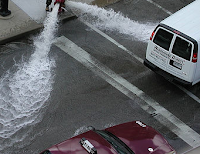Driving on stretches of municipal roads can sometimes reveal unsightly trash and wastewater sludge on the road or curb. They’re actually blights to municipalities that make for unpleasant living conditions—even vehicular accidents. There’s wastewater wherever there are ditches by the roadside. The decaying organic matter in roadside sludge makes its presence known when warm gases condense water and rise from manholes and walkway drains. The emissions are a source of toxic methane gas that smells foul. You wouldn’t want to do a “Marilyn Monroe” skirt stunt over one of those vents.
The fact is that municipalities don’t want this kind of waste from sludge, but it’s unavoidable. The good news is that something can be done about it. The solution will allow municipalities and private corporations to reduce the waste and benefit from extra revenue at the same time. The secret lies in producing beneficial and marketable products from once useless wastewater sludge using a suitable recycling technology. A company that specializes in this endeavor is N-Viro International. What N-Viro does is use biosolids from municipal sludge from roadside drains, sewers, tanks, etcetera, and turn these into either a fertilizer called N-Viro Soil or a clean coal called N-Viro Fuel. The waste to energy processes used are patented and done in special facilities such as the one in Daytona Beach, Florida. The process in making N-Viro Soil combines organic sludge and alkaline wastes from the cement-making and power-generation processes. For N-Viro Fuel, coal is mixed with manure or other biosolids to produce a clean-burning altenative energy source touted as clean coal. This belongs with other opportunity fuels as it is a new, renewable, and creates money while providing energy.
Both N-Viro Soil and N-Viro Fuel are waste to energy products, with the former providing nutritional energy for crops to grow and the latter giving energy for electricity generation. These are not our usual sources of energy and are sustainable unlike fossil fuels or products with artificial components. Waste materials like sludge from roadside sewers are the key. As long as there are municipal wastes to process, and for sure our municipalities won’t be running out of this in a long time, we can produce these immensely-reliable products. If all road and infrastructure organic sludge can be effectively collected and used to make marketable products like N-Viro Soil and N-Viro Fuel, municipalities can have a continuous source of revenue and people will be dealing with stench from organic wastes a lot less. Trips across town will become a more pleasant experience with lesser chance of you coming into contact with gas and slippery sludge that could ruin your day. N-Viro can make municipalities a lot cleaner and safer for vehicles and their travelers.
N-Viro licenses its waste to energy green conversion technologies to municipalities in the United States and elsewhere. As long as there’s organic matter from wastewater sludge, sewage, and other sources, it is possible to make alternative energy products. Since going public in 1993, N-Viro has made over $40 million in sales. It only goes to show how effective the technologies are and how much governments benefit from very useful and highly-marketable products. http://www.nviro.com

Cheap Visitors: your partner in doing business on the Internet! Get targeted website visitors. Register here.














No comments:
Post a Comment